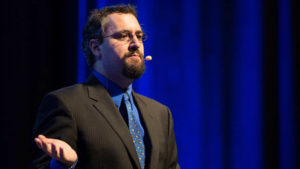
Your potential is unlimited.
I realize that’s the type of cliche that you normally find embossed in cursive script on the side of coffee mugs. It’s trite and impersonal and overused.
But it’s also true.
Your potential to earn and grow is limitless. But it’s not free. You need to invest time and money into developing your potential.
Your time and money are limited, though, and you could also choose to invest in market-based assets, like stocks, bonds or real estate.
How do you make that decision?
Are you going to invest in yourself? Or the market? Or both — and in what proportion?
How do you make these choices?
When you’re buying a few shares of a total stock market index fund, you have a generally clear idea of what you’re getting. You’ve seen the historic returns. You can predict, to a reasonable degree, the consequences of that investment over a multi-decade span.
But when you’re investing in yourself — e.g. learning a new skill, developing a side business, or taking a class — you can’t rely on the same formulas or models. There’s no chart mapping the historic returns.
Financial capital is easy to track. Human capital is harder to quantify — but potentially more rewarding.
Can you compare investing in assets vs. investing in yourself?
How can you make a smarter decision about your own path?
On today’s podcast, I talk to Michael Kitces — a financial planner, entrepreneur, and all-around smart guy — about this million-dollar decision.
Resources Mentioned:
Websites:
Books:
- Essentialism, by Greg McKewon
Thanks to our sponsors, Blue Apron and Audible!
Do you spend more money at restaurants (or ordering take-out) than you’d like?
If so, check out Blue Apron. For less than $10 per person per meal, Blue Apron delivers seasonal recipes along with pre-portioned ingredients to make delicious, home-cooked meals.
Each meal comes with a step-by-step recipe card and pre-portioned ingredients and can be prepared in 40 minutes or less.
You can customize your recipes each week based on your preferences. Blue Apron has several delivery options so you can choose what fits your needs. And there’s no weekly commitment, so you only get deliveries when you want them.
You’ll love the convenience and ease of finding dinner ingredients on your doorstep. Give them a try. Get your first THREE meals FREE — with free shipping — at BlueApron.com/afford.
Audible
I love reading … but sitting in one spot is time-consuming. While I love physically reading (with my eyes), I also listen to audiobooks; reading with my ears while I’m at the gym, cooking dinner or otherwise multitasking.
I listen to one audiobook a month, thanks to my Audible subscription. Audible has a huge selection of books and their app has a simple, intuitive, user-friendly interface.
Head to audible.com/trynow for a free 30-day trial.